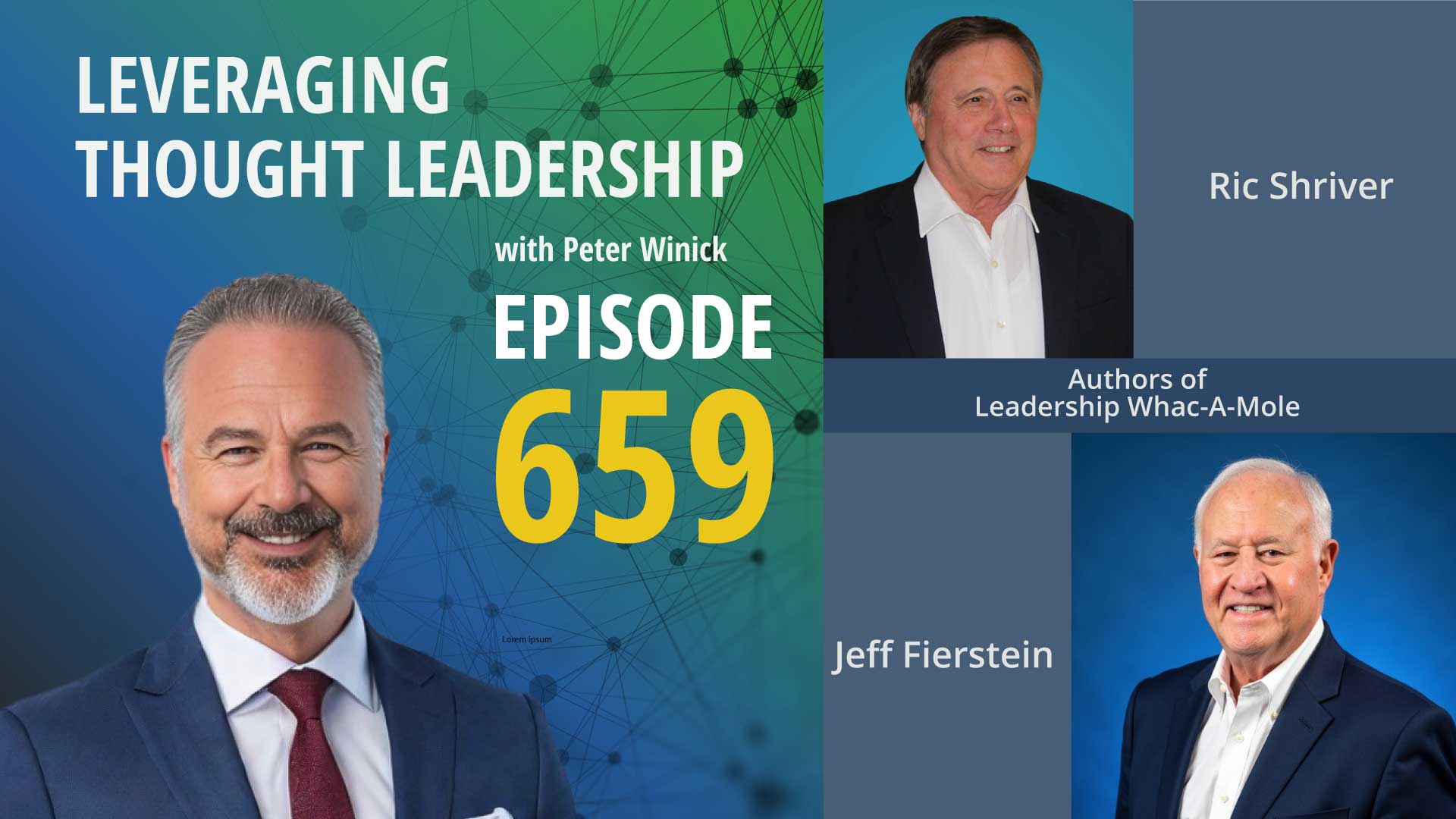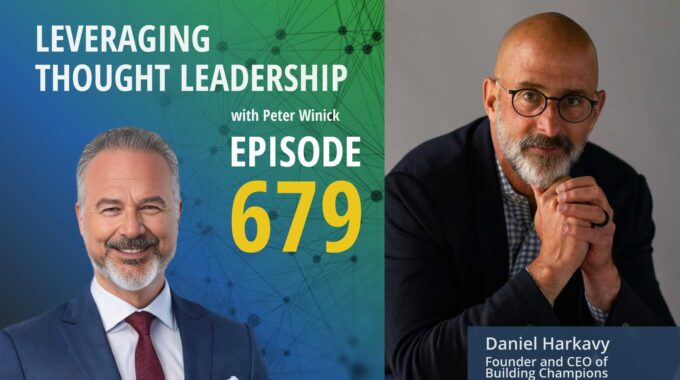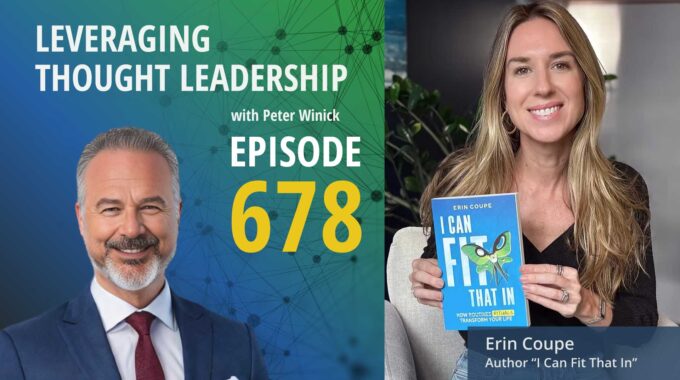Coaching at the Top, Leveraging AI, and Playing the Five-Year Book Game This episode explores…
From Consulting to Content: Turning 40 Years of Wisdom into a Book | Jeff Fierstein and Ric Shriver

Turning field-tested leadership lessons into a compelling, practical book.
Are leadership challenges coming at you nonstop? This episode explores how real-world consulting insights can be transformed into practical thought leadership—and how to get those ideas into the right hands. Packed with lessons on authorship, messaging, and marketing that make your content matter.
What if the game of Whac-A-Mole perfectly described your leadership challenges?
Ric Shriver and Jeff Fierstein think it does. These two veteran consultants have spent over four decades tackling recurring, high-stakes issues inside organizations—and they’ve captured those lessons in their book “Leadership Whack-A-Mole: Actionable Strategies to Leadership Challenges”.
Today’s episode, Ric and Jeff join Peter to explore how they’ve turned decades of shared experience into a practical, real-world guide for leaders. They break down the leadership issues that keep popping up across industries—and how to stop reacting and start leading with intent.
You’ll hear how they co-authored the book using a creative “client and consultant” back-and-forth format, bringing both the problem and the solution to life. They explain why holistic thinking and real-world examples matter more than trendy buzzwords, and how their book is designed as a field manual—not theory—for leaders at all levels.
Ric and Jeff also speak candidly about what it’s like to move from writing to marketing—especially when you’re more comfortable solving problems than promoting your own work. Their insights are honest, valuable, and relevant for any thought leader looking to get their ideas into the hands of decision-makers.
If you’ve ever felt like you’re playing Whac-A-Mole in your business, this episode offers the clarity—and calm—you need.
Three Key Takeaways
Leadership Challenges Are Recurring—But Solvable Many leaders face the same issues over and over, much like a game of Whack-A-Mole. Ric and Jeff highlight that these aren’t random events—they’re symptoms of deeper systemic issues. Their book offers a practical, experience-based approach to diagnosing and solving those patterns.
Thought Leadership Can Be Built from Shared Experience—Rather than theory or research alone, their content comes from decades of real-world consulting work. By using a client-consultant format, they deliver insight from both sides of the leadership equation, making their ideas accessible and actionable for readers.
Marketing a Book Requires a Mindset Shift—Writing the book was only half the battle. Ric and Jeff learned that promoting thought leadership requires stepping into new roles—connecting with networks, refining their message, and overcoming the reluctance to “sell.” Believing deeply in their content helped them get comfortable with promotion.
If you enjoyed our conversation with Ric Shriver and Jeff Fierstein on turning decades of consulting experience into practical thought leadership, you won’t want to miss this episode: Advice for Marketing, Messaging, and Publishing Books with Aurora Winter. Just like Ric and Jeff, the Aurorain dived into the real-world challenges authors and thought leaders face—not just in writing the book, but in getting it into the right hands.
You’ll hear candid advice on crafting compelling messaging, navigating the business side of publishing, and building visibility through smart marketing. Both episodes highlight a critical truth: writing a great book is just the beginning.
Whether you’re an author, consultant, or executive with ideas to share, this conversation will help you move from manuscript to market with clarity and confidence.
Transcript
Peter Winick And welcome, welcome, Welcome. This is Peter Winick. I’m the founder and CEO at Thought Leadership Leverage, and you’re joining us on the podcast today, which is Leveraging Thought Leadership. Today, we’ve got two for the price of one. So we’ve got two guests who are co-authors and co-founders of leadership whack-a-mole. So we got Ric Shriver and Jeff Feirstein. So I can’t go into their bios, but they’re actually pretty long and intense, and I’d rather just chat with them directly than tell you how wonderful they are, but they are wonderful, so. Anyway, welcome aboard, gents. All right, thank you, Peter. So give me the short version of maybe, let’s start with maybe on the personal side, how you two connected to go down this path together.
Jeff Fierstein Yeah, Rick, why don’t you tell that story
Ric Shriver Well, we actually connected the first time, probably when was that? Jeff, 42 years ago, when I, uh, visited his facility up outside of Chicago. I was working at the corporate office for hospital quick corporation of America. Yeah. They asked to go up and visit a hospital that he was located in. He was the head of education training and development in that facility. And so I think he says we had lunch. I don’t remember that lunch. I’m not exactly what. I think, I think he was doing the beer steam thing instead of the beer steam thing. That’s just my thought. But, uh, anyway, we, uh we wound up working together at the corporate office. About a year later, Jeff moved to Nashville and, um, we wound up working for a year and then we restructured a little bit and Jeff became my boss and boss. Yeah. He was a tough boss, but he understood my frailties and helped me develop my performance. So we worked together for about. Four, four and a half years, um, organized again. And, um I wound up doing some consulting work, brought Jeff in to help me out with that as he had moved out to Phoenix and, um couple times, Jeff and I worked together on a couple of projects where I was the project lead, uh, but we’ve maintained our friendship for, for all the years and shared many stories and opportunities together. So that’s, that’s my side of the story.
Jeff Fierstein Peter, if I could just throw something in.
Peter Winick I was gonna say, you get a rebuttal, so.
Jeff Fierstein Over the 40 years that we’ve worked together, we’ve both worked internally and externally in organization development and human resources. And it’s been really interesting because we’ve had a chance over all that time to really talk about leadership and organization. We’ve talked about our own experiences together. We’ve talk about places that we worked and people that we have worked with. So we’ve got quite a history that led to writing the book.
Peter Winick Yeah. So, you know, one of the things that I’ll just sort of comment on there is in this world of thought leadership, I find it’s pretty common that the relationships endure the roles, meaning, Hey, we started, he was my boss, or this person was a client or a vendor or whatever, and just the, the titles change and the dynamics change. And it could be, you don’t, he worked for you. And then I worked for him and then, or we started this thing together. I think the reality is that when you’re exposed to another persons thinking their, their, the, their way of ideas, the way they operate. Not that the roles don’t matter. They matter in the context of the scenario, but you’re like, that’s somebody I want to do stuff with whatever stuff is right. And I’ve seen that so many times where, you know, the origin stories were like I said, whether they’re coworkers or someone was someone’s boss or whatever, so I just wanted to point that out because it happens more often than you think.
Jeff Fierstein Yeah, and I never planned on writing a book, but Rick called me up a couple of years ago and said, you know, we’ve got so much experience together. We’ve seen so many successes and setbacks. We really ought to write a book about it. So I thought, okay, I’ll let him think we’re going to write a book and eventually he’ll forget about it, but no, we actually did.
Peter Winick So is that giving him credit or blame for getting the book? Disappointed it’s Craig. Yeah, maybe, maybe. Yeah. So what was, so what was the spark to get the book done? Hey, we should, we shouldn’t have a format to put our stuff in. Or what was. The genesis of that.
Ric Shriver Well, I probably had the original thought in it. Then that thought came across my mind, probably 10, 12 years ago. It were more of a kind of an emotional desire I had to catalog and document some of the, some of challenges that I went through personally. And that’s what I originally shared with Jeff, but as we got to talking about it, as Jeff just said, we shared so many common experiences and challenges thought process kind of moved to, okay, let’s, let’ talk about those challenges. Listen. We both have enough experience and enough knowledge in this area that we could put together, I think something that would help leaders in any number of different businesses at all different levels, really access what I, what I’ve liked to call a field guide, a resource, you and with those challenges in a practical way. And that, I, I that’s the other watchword here for us is that, you know, we dealt with these things, we know what works, what doesn’t work. And so we were able to document some of those stories and challenges. Of course, changing the names and faces to protect the industry. But, uh, but then to be able to, to outline some current thinking in terms of advanced thought about how to deal with those challenges. But then in reality, how we approach some of those things, what worked, what didn’t work and our conclusions about maybe addressing those challenges in a more effective way. So writing a book.
Peter Winick It’s difficult. They often say it’s a lonely task, but when you’re doing it, collaboratively is different. How did you come up with the, let’s call it sort of the division of responsibilities, the rules of engagement, the, how are we going to do this? Cause it’s not going to be, I read a sentence and then you write a sentence, right? It’s not that, like, how did you divide and conquer the deliverable part of this? Cause there’s work that needs to be done and the concepts I get, but like, How’d you actually break it apart?
Jeff Fierstein Yeah, we, we kind of jumped in, I think, and we started writing about different topics and as we went along, we got more organized, uh, made some decisions about what should be in the book and how it should be laid out. And basically we, set up this format where, uh one of us would be the client. The other one would be to consultant. And so, uh just for example, Rick would write something as the client and then I would respond as a consultant. To what he had written and so it worked that way and we really liked it because it just was a continuation of the conversations that we had been having for 40 years.
Peter Winick So I want to cut to that. So it’s, there’s sort of a role play piece and I’m assuming the scenarios that you were talking about were things that you both knew because you were both involved in the actual events.
Ric Shriver For the most part, I mean, there were some, there was some situations that Jeff was exposed to in his consulting capacity that I was not directly involved in, but there were common themes.
Peter Winick But I like that role. So you’re looking at, so here’s a situation. One of you looks at it through the role of the client. One of your looks at through the roll of the expert. Cause those two perspectives, I think it’s kind of interesting in this world is are often pretty different, right? So the consultant comes in and says, well, it’s obvious that this is what’s broken, right. And then the clients look in there going, no, no. It’s fine that our, you know, turnovers through the roof or our profits say, no no, it doesn’t nothing to see here. I’ll see you next time.
Ric Shriver That’s all good. So from my perspective reflected our styles to Jeff. It’s very much a highly analytical, a very structured individual. Yeah, we discovered that early on in our working relationship. I sometimes can get a little off the wall on, on the Disk scale. I’m a high, I, you know, I tend to be out there with some creative thoughts and Jeff has to reel me in from done to done, but it was a good relationship because as a client. You know, I would come up with these thoughts or ideas, and Jeff was always good about challenging those and saying, I’ll get you back down to earth, which worked well in the relationship that we had.
Peter Winick So now you get through the hurdle and the challenge and the blood, sweat, and tears of writing a book, and now it’s gotta be released into the wild, right? So just when we thought writing the book is the hard part. Right? Oh, yeah. The next part. Tell me, and this I think is critical because writing a books is so hard, right, and it could take so long and you’re always questioning should I have done it this way or that way, or this would have been a better story, whatever. Then it’s done, right. So you hit send or publish or whatever. Now… Is a whole different role that you have, right, in terms of being somewhat promotional and the marketing and all that. So what’s that journey been like? Because I think a lot of authors don’t think about the other side of after it’s written.
Jeff Fierstein Role I’m playing. That’s right. Yeah. And, and we did think about that. We’ve done a lot of self education during the time we were writing the book. And we realized that the real key is not the book, it’s the marketing. We have a great book, but unless people know about it, it not going to reach their desk. So we’ve learned a lot on our own about marketing, marketing through social media, marketing through email market. Here’s a podcast that I think is a great example of how people can spread the word about their thinking or even a book. So yeah, a lot of self-learning and there are so many people out there, as you probably know Peter, that have their own ideas about how to market it. And we’ve gone down a few blind alleys.
Peter Winick If you’re enjoying this episode of Leveraging Thought Leadership, please make sure to subscribe. If you’d like to help spread the word about our podcast, please leave a five-star review at ratethispodcast.com/LTL and share it with your friends. We’re available on Apple podcasts and on all major listening apps as well as at thoughtleadershipleverage.com/podcast.
Peter Winick Stay there for a minute, Jeff, because I like the idea of starting with that beginner’s saying hey We’ve never marketed a book before. Let, let’s learn how to do that. Right. Let’s figure that out. And then you go and it’s not the world is flat. The world is round. There’s probably 32 perspectives or whatever. So I do you, how do you synthesize that? How do you process that as a trial and error? Like what are some of the things that you did that you wouldn’t do again? And what are the things are surprising that like, wow, that thing that sounded like maybe silly is really effective.
Ric Shriver You know, one of the things we discovered early on is that while we thought we had a very creative title, and I think the concept behind it still makes a lot of sense, the whole notion of the whack-a-mole game that, uh, you know, you hit one thing and 14 other things pop up just the whole open systems, um, holistic organization perspective. But unfortunately, when a book goes out on, for example, Amazon and people are doing keyword searches, they’re not gonna, they they’re not gonna type in whack-o-moles games. And so…
Peter Winick Well, but I, but, I would push back and argue there’s good and bad to that. Right. So nobody’s Googling, I need a book called whack-a-mole, right. They’re playing whack-o-mole, whatever. Right. So, so on that standpoint, I wouldn’t agree that would be, let’s call that a negative, whatever, that might be a challenge, but if I go down the path of looking up books in the space, then it’s a differentiator in that it stands out because there aren’t 87 books on the whack-amole theory of leadership, so that’s a balancing act. Right.
Ric Shriver And I think we thought that didn’t we, Jeff, we were kind of hoping that’s where people would get to is, and we did a lot with keyword searches. You know, we did the, uh, the marketing campaigns in, at Amazon with the KDP keyword searches and spent, spent a lot of money. I haven’t gotten a lot results with that, but we’ve also then recognized that we need to start making these connections. We’re talking to you. We’re doing the podcast. We’re reaching out to people that we know in our discipline. Trying to connect with them. We’re going to be looking at a potential conference coming up early in the fall. Right. And so hopefully make it a presentation there, but it’s a, it’s a long. Hey, hey, what the?
Peter Winick That outreach piece, because I think what you tapped into there is critical. Yeah, there’s a school of thought that’s, well, we’ve got to market this book. So it’s going to go out to the universe, right? Strangers, people that don’t know us, whatever. And to me, that seems so silly and ridiculous as a first bite of the apple, because you’re both at this for 40 years, I’m assuming you might have come across some people over your careers that might like you, that might admire you, that might respect you, right. And most people don’t think of flipping the typical SEO thing because SEO by definition means I’m trying to find a stranger to come my way versus how do I deliberately and strategically target my network to say, Hey, we wrote a book. Like, you know, when I have, and the recipient of that, I’m excited for that person. Like I’m like, I want to help them. I want spread the word a little bit. So how did that, what was the reception to that messaging?
Ric Shriver You know, Jeff, you’ve had some good experiences with that.
Jeff Fierstein We actually started out working with friends and relatives and people in our networks to let them know about the book and to ask them to spread the word. And then we’ve looked at a number of different methods for doing the marketing. We’ve tried, we’re still doing the social media, which is getting us some benefit. We’re now getting into email, which we think will be much more effective. And we’re reaching out to people that we know or people that we’ve been led to in universities, where they might be able to use the book in corporate entities where they might be to or might want to actually use the books for their own training. So we’re spreading out and we’re trying a number of different things that we hope and expect will be productive.
Peter Winick So how do you get over a challenge underneath that? For some, not all is they get that. That’s a rational approach, right? I’m going to go after my network, et cetera. But then when it comes down to it, there’s anxiousness or, or reluctance or, oh, I don’t want to be salesy. I don’t want like, Ooh, this does like whatever. And they can’t kind of get out of their own way enough to hit send or pick up that phone or do that thing. Was that a challenge for either of you?
Jeff Fierstein Yes, it was. And actually we’re both doing a lot more what you are calling selling, uh, where we’re going out to people and actually selling, not necessarily an individual book, but like I mentioned before, selling opportunities to, to train other folks.
Peter Winick So how did you get over the hurdle? Cause again, for some it’s second nature for others. It’s like, Ooh, I’ve never had to do that. I’m, I, you know, I’m the academic or I’m the writer or I am the, you know, not that, not that they feel cheesy. It’s just an unknown domain. It is still either. How do you do that? Or I’ve telling has a bad connotation.
Jeff Fierstein Yes, yes, Peter and all the years that I did consulting, uh, as an independent consultant, one of the difficulties I had was in selling, but what I found with the book is I believe in it so much and I believe that it has so much potential for people to learn and to improve in their leadership skills. That’s really getting me over the hurdle of being able to pick up the phone and call somebody and, and sell.
Peter Winick You know what, that’s the million dollar answer. And it’s a lot. I give a version of that advice to a lot of my clients saying, you wrote the book. Yes. How much time and energy to take you? Oh my God, months, years, thousands and thousands and thousands of hours. Do you believe in it more than anything else? I’m like, okay, you have a responsibility then to shepherd it, to evangelize it, get it out there, not go asking your friends for money to buy your granddaughter’s Girl Scout cookies. Like that’s kind of annoying, right? But like, I love the way that you frame that Jeff is that, you know, that. In your heart of hearts, when you get that book in the hands of the right people and they read it, they’re going to get far more value than the couple of bucks they pay for the book by being exposed to these ideas and stories. I agree. Yes. And then I think a little positive reinforcement, you know, little wins is what I always say, right? You know, do that a couple of times. As we start to, to wrap here, what are the biggest surprises? Now that you’re on the other side of this, you’re more in the marketing mode. Good, bad, or ugly that you’ve had in terms of trying to get the book out into the world.
Ric Shriver Well, I think one of the things I didn’t realize is just how many books there are out there and what that competition looks like and the varying quality of some of those books. I mean, there are all kinds of people that think they have good ideas what could be put in print and distributed, but I had no idea just how big that field was. So when you get a ranking, for example, on Amazon and you’re not past the two million mark, a lot of people go, what? That can’t be the case. But there are lots of and fewer than 1% of the population actually ever writes a book. That’s surprising too.
Peter Winick Yeah, yeah, yeah. Jeff, and for you, Jeff.
Jeff Fierstein For me, I think it’s been all of the energy, the effort, and the love that went into putting this book together. And when the book was done, I didn’t expect to kind of crash from having it done. It was completed. And so now we needed to jump into the marketing. And so the whole routine of it was very new for me and very unique for me, and very challenging too.
Peter Winick No, I love that because I think there’s sort of a couple of, I call them not crash points, but okay, the manuscript’s done. Yeah. Wow. Let’s celebrate that. It’s okay. Here’s the next journey. Let’s start marketing that that’s never complete. You know, when a manuscript’s, done that, that’s complete done. Can’t be undone. Right. When are you finished marketing your book? I would say probably sometime after you’re dead. Cause at some level, you know, books are not seasonal. It’s not like You know, the florist is probably pretty lonely the day after Valentine’s day, right? You don’t have that phenomena with a book and the degree or the volume by which you’re in that mode changes. But I would argue, particularly with your sort of mindset around it, you’ll probably never stop and you’ll probably never want to stop exposing and evangelizing those ideas.
Ric Shriver Yeah, I think one of the things that I realized is that, and both Jeff and I are pretty much retired from our formal roles in business and industry consulting is that this keeps our minds alive, keeps us invested in and, and engrossed in, in those things that really we were passionate about in our separate capacities. Every week we’re writing blogs out on our website. Good, good articles. Jeff wrote one this week. It’s awesome. Check it out. It’s, you know, talk about top of the line thinking, but it’s all about the whole notion of holistic thinking and sub optimization. And so we’re out, we’re challenging each other with that. And hopefully we’re gonna start getting some connections and people are gonna start recognizing this as a real resource for them.
Peter Winick It’s a marathon, not a sprint. That’s what I… That’s right.
Ric Shriver That’s right.
Peter Winick Great chatting with you both today. And I appreciate the, the, the transparency and the passion and I wish you all the best. Thanks so much guys.
Ric Shriver All right.
Jeff Fierstein All right, Peter, take care.





